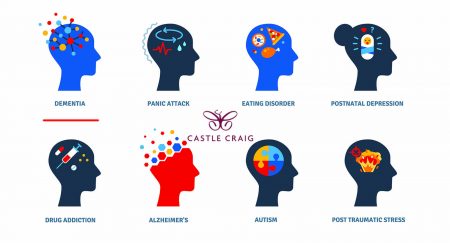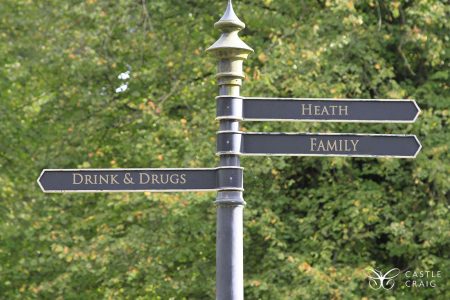On this page, we address a common myth linked with alcohol misuse and binge drinking – that drinking water can ‘flush’ alcohol from your system. If you are hoping to quickly reduce the alcohol content in your blood for a blood test you may be disappointed to learn that the most effective way to lower your blood alcohol level is to stop drinking and wait. Once you consume alcohol, your body starts to break it down to eliminate it from your system, mainly through the liver. How long does this take? Everyone metabolises alcohol differently and at different speeds.
However, there are still steps you can take to help your body process alcohol quicker and get sober faster while maintaining your health.
Here is all the necessary information about how the human body metabolises alcohol, how long it takes to eliminate alcohol from your system, and how to speed up this process.
Concerned About Your Drinking?
If you’re thinking about alcohol rehab, Castle Craig offers free alcohol addiction assessments as part of our admissions process to guide you toward appropriate treatment. Our expert-led alcohol detox services and tailored alcohol rehab programs are designed to support you on your recovery path with care and professionalism.
Through our free assessment, we help you evaluate your needs and explore suitable options for treatment. Learn more about the cost of alcohol rehab or take the first step today by accessing our free assessment services. With personalised support, Castle Craig aims to make your recovery process easier and more accessible.
How Long Does Alcohol Stay in the System?
Once alcohol enters your bloodstream after you drink, your body starts to break it down and metabolise a portion every hour. Your body flushes the alcohol out of your system steadily but slowly. There is no way to speed up the liver’s processing time. As a result, if you drink a lot or very quickly, some unmetabolised alcohol will linger in your blood, leading to intoxication.
Your liver processes alcohol at the rate of one drink per hour, according to the National Institute on Alcohol Misuse and Alcoholism (NIAAA). That means it can take three to seven hours for your body to metabolise and eliminate one to four drinks, depending on several factors.
Age, weight, food intake during alcohol consumption, medications, liver health, and the time between drinks all contribute to how long alcohol remains in your body.

Download Our Brochure
How To Help Yourself Feel Better From a Hangover
A hangover is a term that designates a set of undesirable effects that occur when you drink too much. In medical terms, a hangover is an alcohol intoxication.
There are a few simple, natural methods that you can try to help you reduce hangover symptoms and regain alertness. These methods will not help your body to process alcohol any quicker and you will still remain intoxicated and impaired.
Stay Hydrated
Dehydration caused by alcohol is the primary reason for hangovers. So, it is essential to make sure you drink plenty of water before, during, and after drinking.
Increase Your Water Intake
While the body works on metabolising alcohol, it suffers from dehydration. You must increase your water intake after drinking too much alcohol to rehydrate.
Water also helps your kidneys to function properly.
Increase Your Salt Intake
In addition to drinking plenty of water, doctors recommend consuming mineral salts such as tomato or vegetable juice and salted broth to replenish electrolytes and restore a healthy electrolyte balance quickly.
Drink Green Tea
If you have been drinking, green tea is an excellent way to preserve your liver and counter the symptoms of intoxication.
Green tea has anti-inflammatory properties that can boost immunity and detoxify the body.
Remember, the healthier your liver is, the faster it will process alcohol and help you reach sobriety.
Eat and Avoid Certain Foods
The food you eat while recovering from a night of drinking will affect how quickly you detoxify your body. Some foods can help speed up the process and make you feel better, whereas others hinder recovery.
Here are some tips for what to eat and not to eat as you flush alcohol out of your system.
Foods to Avoid
Greasy and fatty foods
When recovering from alcohol intoxication, it is common for people to crave junk food. However, this is counterproductive. Eating dishes with high levels of saturated fat will only add more stress to the digestive system, so it has to work harder to eliminate the remaining alcohol.
Foods high in sugar
It is tempting to reach for sugary snacks when you have a hangover, but it is best to avoid them. Consuming foods rich in sugar can further throw off your blood sugar levels, making the effects of the hangover last longer.
Foods to Eat
Probiotic foods
Eating probiotic-rich foods can help your digestive system recover from the consumption of alcohol more quickly.
Green vegetables
Green vegetables contain vital minerals, amino acids, and other essential nutrients to help the body recover after excessive alcohol consumption. In addition, high levels of fibre are beneficial for digestive issues such as diarrhoea or constipation that may arise after drinking.
Berries
Berries like blueberries, strawberries, and raspberries have rightly earned the title of superfoods as they are full of antioxidants and necessary nutrients like fibre, vitamins C and K, and manganese. Berries are also rich in water, which will help you stay hydrated after drinking.
Wholegrains and wholegrain products
The complex carbohydrates in whole grains help absorb the extra alcohol in your system and provide much-needed B vitamins that are lost when you drink.
Cayenne pepper
Cayenne pepper can help reduce the discomfort associated with alcohol withdrawal, such as stomach pain, nausea, and headaches, and improve gut health.
Oily fish
Eating oily fish high in Omega-3 fatty acids can protect the brain against irreversible damage from alcohol consumption, warding off dementia and other conditions. It is a vital diet ingredient for all individuals recovering from alcoholism.
Zinc-rich foods
Zinc deficiency can hinder the effectiveness of hepatic enzymes that break down alcohol, which intensifies and prolongs the effects of alcohol intoxication. Adding zinc-rich food sources to your diet will speed up alcohol metabolisation.
Bananas
Bananas are the most abundant source of potassium, and they are easy to digest. They will not upset your stomach.
Iron-rich foods
Eating iron-rich foods can give you energy, make you feel replenished and help to alleviate the effects of alcohol consumption.
How Do Urine Tests for Alcohol Work?
The Ethyl Glucuronide (EtG) urine test can detect the presence of any alcohol consumption in the urine. Ethyl Glucuronide is present in the body after consuming alcoholic beverages. It is a biological marker of alcohol consumption.
The EtG urine test is essential when complete abstinence is required, such as during withdrawal or in professional settings with zero-tolerance policies.
How Long Can Alcohol Be Detected on a Urine Test?
EtG remains detectable in urine for approximately 2-3 days following the last consumption.
How Does the Body Process Alcohol?
Once you ingest alcohol, it passes through the portal vein to your liver and then to your heart via the hepatic vein. Alcohol is soluble in water, which allows it to spread throughout the body’s fluid compartments. The amount of fat versus lean muscle someone has can influence their volume of distribution, which could explain why men and women show different responses to alcohol.
The liver breaks down most consumed alcohol, eliminating 95% of it from the body. Two enzymes do most of this work, and the most important is Alcohol Dehydrogenase (ADH).
How these enzymes function and other factors, such as genetics, will determine if someone is at risk of developing alcoholism or is alcohol intolerant.
Alcohol is processed in the body and removed from the bloodstream through the metabolic system (90 to 95%). The remaining 5% exits the body via breath, urine, and sweat.
Several studies have shown that alcohol elimination rates in humans are typically between 0.12 and 0.16 g/L/h. Stress can cause a slight uptick in elimination rates, making it 0.18g/L/h on average.
Does Water Flush Out Alcohol?
Drinking water does not affect the speed of alcohol metabolism in the body. A regular-sized drink will take 1 to 1.5 hours to process, no matter how much water you consume along with it. However, drinking water between alcoholic beverages can help stave off a hangover or reduce its severity.

Dangers of Drinking Too Much Water To Flush Alcohol
If you drink excessive amounts of water it can lead to water intoxication or poisoning, which affects brain function due to the swelling of cells, including brain cells. This swelling increases pressure within the brain, leading to symptoms like confusion, drowsiness, and headaches. In severe cases, it might result in high blood pressure and a slowed heart rate.
Sodium, an essential electrolyte for fluid balance within cells, is particularly affected by overhydration, causing a condition known as hyponatremia. When your sodium levels drop due to too much water, it can lead to water entering and swelling the cells. This swelling raises the risk of serious complications, such as seizures, comas, or even death.1
Alcohol Detox Programmes
Alcohol detoxification programmes are treatment plans created for people dealing with alcohol dependency. They may be residential, with the patient living at a specialised clinic for the duration of the programme, or community-based (out-patient), with the patient attending the treatment centre from their home location. Residential rehab is especially advantageous for those who struggle to remain sober and need assistance to overcome their addiction.
An alcohol detoxification programme often includes withdrawal medications to fight the physical and mental symptoms of withdrawal as well as enrollment in therapy sessions which will help individuals gain insight into their addiction so they can overcome it and maintain sobriety for the long term.
Downsides To Exercising After Alcohol Consumption
It is not a good idea to work out after drinking alcohol. Alcohol affects the muscles’ ability to absorb and use glucose, which they need for energy, decreasing your endurance. A study from Australia concluded that impairment of motor skills is one of the side effects of consuming alcohol that also affects athletic performance. In addition, exercising will add more stress to your liver as it has to process the toxins from the alcohol and will eliminate lactic acid more slowly, leading to cramps.
Getting Sober: The Best Way To Pass a Urine Test
In the end, if you want to pass a urine test and successfully flush out alcohol from your body, getting sober is the best way. The road to sobriety is not an easy road to take, but recovery is always possible. Here are some tips on how you can get there.
- Decide that you need to get sober.
- Reach out for help.
- Find a detox programme that matches your expectations and needs.
- Power through the withdrawal process.
- Build a support system and enrol in therapy for a successful recovery.
- Access aftercare support to minimise the risk of relapsing.
Getting Sober at Castle Craig
At Castle Craig, we will design a treatment plan tailored to your needs.
Expert staff will assess and evaluate your condition to determine the best path for recovery. If you require a detox programme, our skilled professionals will provide support throughout the withdrawal process and detoxification. We will make the process easier by administering medications and therapies and ensuring 24-hour supervision in a peaceful environment.
After regaining physical and emotional stability, your recovery programme begins. You will participate in activities while receiving intensive behavioural therapy, family therapy, and other complementary therapies focusing on understanding the root of your addiction and making life more fulfilling without alcohol. When it is time to leave rehab, our continuing care helps ensure that you stay on track with the relapse prevention plan developed during your stay.
The Time To Get Sober Is Now
Our friendly, expert team are ready to help you on your road to recovery.
Call us to find out more about our admissions process.
UK: 01721 546 263
International: +44 172 178 9126
FAQs
How Do You Eliminate Alcohol From Your System?
Your liver metabolises and eliminates 95% of the alcohol you consume. Your body expels the rest through sweat, breath, and urine.
What Is the Fastest Way to Eliminate Alcohol?
The fastest way to eliminate alcohol is to rest, eat healthy foods, drink water, and wait.
How Long Can Alcohol Be Detected on a Urine Test?
A urine test can detect alcohol for 2 to 3 days after the last drink.
-
References
- NIAAA Publications (no date b). Available at: https://pubs.niaaa.nih.gov/publications/aa72/aa72.htm.
- Grodin, E.N. et al. (2020) “Sensitivity and specificity of a commercial urinary ethyl glucuronide (ETG) test in heavy drinkers,” Addictive Behaviors Reports, 11, p. 100249. Available at: https://doi.org/10.1016/j.abrep.2020.100249.
- Paton, A. (2005) “Alcohol in the body,” BMJ, 330(7482), pp. 85–87. Available at: https://doi.org/10.1136/bmj.330.7482.85.
- Brumback, T., Cao, D. and King, A.C. (2007) “Effects of alcohol on psychomotor performance and perceived impairment in heavy binge social drinkers,” Drug and Alcohol Dependence, 91(1), pp. 10–17. Available at: https://doi.org/10.1016/j.drugalcdep.2007.04.013.



